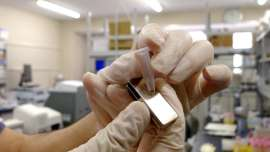
COVID-19: Nagoya University creates artificial antibody for new corona: in just 4 days
Nagoya University: Research Group
When infected with the new coronavirus, antibodies are produced in the body.
Research groups such as Nagoya University have succeeded in quickly and artificially producing a protein similar to this.
Professor Hiroshi Murakami of Nagoya University and a research group of Nagoya Medical Center succeeded in producing antibodies.
It was also announced that it was possible to suppress infection to normal cells.
New coronavirus:
When infected with the new coronavirus
A protein called an antibody is made in the body,
Antibodies prevent the virus from entering normal cells,
It has been with.
Preparation of artificial antibody: Required period
Traditional method:
In the past, it took at least several weeks to artificially produce antibodies.
This time method:
The research group
From over 10 trillion artificial antibodies
Select the one that is associated with a specific virus,
We have developed a new technology called “TRAP presentation method”.
Succeeded in making a new type of coronavirus antibody in just 4 days.
Confirmed virus infection suppression:
In addition, we discovered that the artificial antibody produced this time has the characteristic of binding very strongly only to the new corona.
As a result, “we were able to confirm that the virus infects cells was suppressed.”
reaserch result
It will be published in the electronic version of the American scientific journal “Science Advances” on the 19th.
Medical | NHK News
https://www3.nhk.or.jp/news/html/20200919/k10012626211000.html
“Artificial antibody” to catch new corona: Development of method to make in a short period of time
Research team:
The research team prepared about 10 trillion types of artificial antibody candidates that were randomly prepared in advance.
With “spike protein”: magnetic beads
There, “magnetic beads with protruding spike proteins attached” that are on the surface of the new coronavirus and are used to infect human cells are introduced.
By catching magnetic beads with a magnet, we caught a large number of artificial antibodies bound to spike proteins.
From among them, two artificial antibodies that bind more strongly were selected.
It used to take two to three weeks, but it took four days.
https://www.asahi.com/articles/ASN9L5V2XN9KOIPE00B.html
Fujitsu and Nagoya University Develop Technology Enabling High-Speed Detection of Toxic Proteins
Using DNA Aptamers Detects toxins 100 times faster than before, holds promise for a future free of food poisoning
Fujitsu Laboratories Ltd.,
Nagoya University Kawasaki and Nagoya, Japan, August 02, 2010
Fujitsu Laboratories Ltd. and Nagoya University
today announced the development of technology that enables high-speed detection of toxic proteins(1) that cause food poisoning.
A new sensor that detects the presence of toxic proteins was manufactured,
by employing a combination of artificial antibodies (DNA aptamers)
which capture the toxic proteins, with a signal converter which converts those “capturing events” of captured toxins into optical signals.
The new sensor
enables detection of toxic proteins 100 times faster than with previous methods.
This new technology
can be used for shipment inspections of various foods to enable faster and more accurate inspections, thus contributing to better food safety.
Fujitsu Global
https://www.fujitsu.com/global/about/resources/news/press-releases/2010/0802-01.html